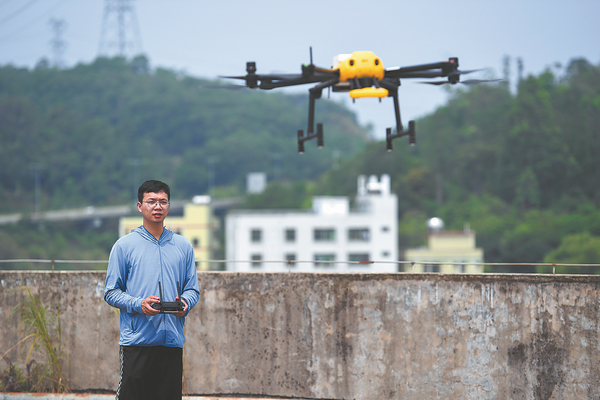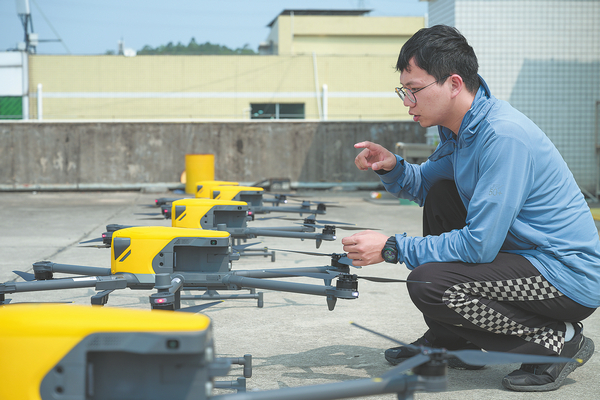


Luo Xikun, a certified drone pilot with Meituan, operates a drone on the rooftop of an office building in Longgang district, Shenzhen. MAO SIQIAN/XINHUA
SHENZHEN — After bouncing around through various gigs since the age of 18, Luo Xikun has finally landed his dream job — flying drones in Shenzhen, South China's Guangdong province.
Now 31, Luo has already participated in the development and testing of 18 drone express delivery routes for Meituan, a leading Chinese e-commerce platform.
Luo started as a kitchen assistant, and later became a food deliveryman at Meituan. While working, the young man kept studying in pursuit of a bachelor's degree.
Curious about mechanical devices since childhood, Luo had always hoped to find a job related to mechanical operation. He decided to give it a shot to fulfill his longstanding dream when Meituan started to recruit drone pilots among the company's food deliverymen in April 2022.
After more than a month of intensive theoretical and practical training, he passed the professional exam on drone piloting by the Civil Aviation Administration of China and achieved the qualification certificate. He was then selected to be an emergency drone pilot for Meituan amid fierce competition.
Since then, both his work environment and life track have undergone great changes. "I used to spend 8 to 10 hours a day on roads delivering food. Now I need to think and learn constantly, otherwise I will not keep up with changes."
He studied previous flight cases and summed up the experience regularly. "Flying is not a small thing, and it allows no mistake," he adds.
With accumulated drone delivery experience, Luo recently transferred to a new position focusing on the drone flight test and new route exploration, which led him to a fantastic place — the Great Wall.
"I never thought that my first time of climbing the Great Wall would be as part of a team launching a drone route there for express delivery," he says.
On Aug 16, Beijing launched its first drone logistics delivery route in the Badaling section of the Great Wall, which enables tourists to receive summer relief items and emergency supplies within minutes. A single trip to the spot used to take around 50 minutes on foot.
Before the launch, Luo and his colleagues spent half a month conducting surveys on the route. Every morning, he started climbing the Great Wall at 6 or 7, taking about 40 minutes to reach the preplanned drone landing site to commence his work.
To Luo, it is "a challenging but exciting experience". Previously, drone route planning and testing was mostly conducted in cities where there was no altitude difference between takeoff and landing sites. However, this route along the Great Wall would have an altitude difference of 200 meters.
The fickle mountain climate, such as high winds, sudden hail and rapidly enveloping fog, also posed challenges to the survey and test flights.

Luo makes sure the drones are airworthy. MAO SIQIAN/XINHUA
Luo says that the Great Wall reflects the wisdom and greatness of ancient Chinese, and today's scitech advancement allows people to experience the Great Wall with greater convenience. "I feel particularly proud of it," he adds.
Luo's occupation transition is not only a personal growth experience, but also keeps pace with the country's pursuit of high-quality development driven by sci-tech innovations.
China has taken various actions to promote high-quality employment for the youth. The country's efforts to foster new quality productive forces, featuring the low-altitude economy and other new emerging industries, are constantly generating new job opportunities for Luo and his peers.
It is a normal phenomenon that labor flows from low-productivity industries to high-productivity ones, according to Li Chunlin, deputy director of the National Development and Reform Commission.
"While promoting economic transformation and industrial upgrading, technological progress will also give birth to many new occupations and jobs," Li says.
He points out that there are currently 1 million job vacancies for drone pilots, a new profession generated from the booming low-altitude economy.
By the end of 2023, a total of 1.27 million drones were registered across the industry, an increase of 32.2 percent compared with the end of 2022, according to a CAAC statistical communique.
There were 194,400 valid drone pilot licenses in the industry by the end of 2023, an increase of 27.2 percent over the end of 2022.
China is deepening reforms in the building of its industrial workforce, according to a set of guidelines recently issued by the Communist Party of China Central Committee and the State Council.
The country will promote modern vocational education, increase efforts to foster talent with comprehensive technical skills, and refine the lifelong vocational skills training system for industrial workers, according to the guidelines.
Eyeing the skies, Luo is "full of expectations", and keen to tap new chances of the growing low-altitude economy.
To him, the drone applications are far beyond the current express deliveries of food and groceries. "Maybe, they can shuttle patients' specimens for testing between home and hospitals."
"The career transformation has increased not only my income but also my interest in drones. And I now have a clearer career target as I want to obtain the drone instructor certificate," Luo says.
点击右上角![]() 微信好友
微信好友
 朋友圈
朋友圈

请使用浏览器分享功能进行分享
